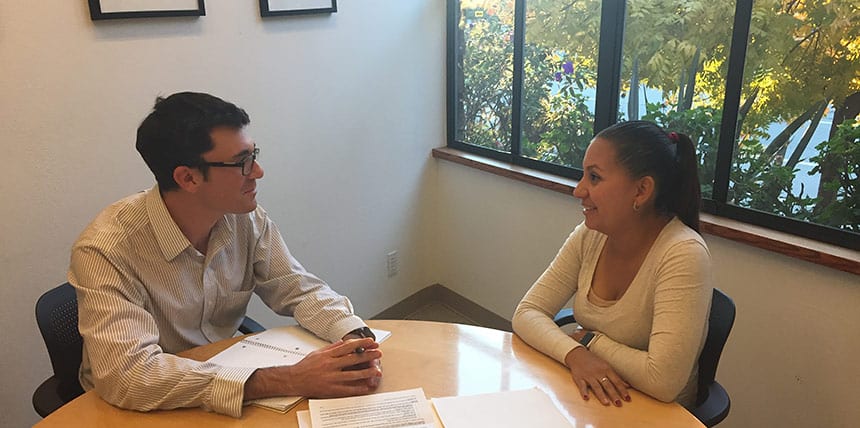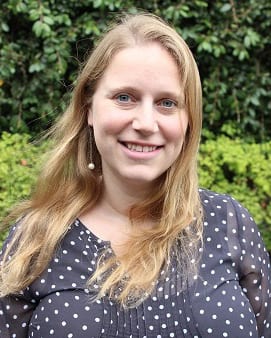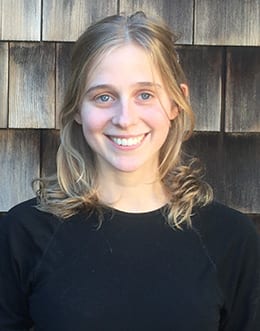
By Andrew Cohen
Their work is often more vexing than vindicating, more trying than triumphant. But for those who provide help—and hope—for clients of the Medical-Legal Partnership (MLP) project, the experience is intensely satisfying.
An initiative of the East Bay Community Law Center’s Health & Welfare Program, the project partners with three area hospitals and recently celebrated 10 years of collaboration with Oakland Children’s Hospital. Founded on a $25,000 budget, the initiative has grown in capacity and impact by helping patients secure basic needs to stabilize their families’ lives.
“This partnership has not only improved the health of patients we see through direct service, it has also educated over 500 pediatricians about the special nature of legal services and how to use lawyers as consultants,” said Gena Lewis, a Children’s Hospital staff pediatrician. “Just as we use a cardiologist for specialized help for a child’s heart condition, it’s now commonplace for a pediatrician to call a lawyer for consultation about a habitability or immigration crisis.”

Doctors and social workers identify legal issues faced by patients and their families, including denial of public benefits. Although patients are generally referred with a single concern, supervising attorney Erin Le and her team of Berkeley Law students dig for broader solutions to their life circumstances—resulting in both direct assistance and referrals to other legal resources.
“Many of our client families have children and adults who have experienced traumatic events or the lifelong trauma of growing up poor,” Le said. “These stressors have real health impacts. Some have clearer causes—a lot of our clients are diagnosed with severe asthma at a young age because of poor housing conditions—but growing up poor is also correlated with higher rates of depression, obesity, heart disease and cancer.”
David Nahmias ’18 admires how the partnership addresses “the many economic and social determinants of health and their connections to poverty; it does not look at law in a vacuum.” Helping a mother of three tackle housing-related issues and appeals of reductions in her food stamps and Medi-Cal benefits recently, he prepared a letter that convinced her landlord to make overdue home repairs. Fluent in Spanish, Nahmias has also nearly resolved her benefits matter after several calls with the state appeals officer assigned to her case.
“My client is a Mexican immigrant and speaks almost no English,” he said. “She recently told me that she would’ve had no idea how to fix her situation without my help or advocacy on her behalf. The complete trust she has placed in me, and the knowledge that I’ve helped provide her and her family reach a more stable situation—that’s extremely gratifying.”
Casting a wide net
MLP appeals and negotiates settlements for denied, terminated or reduced public benefits; advocates on post-entitlement benefits issues such as overpayments and continuing disability reviews; helps prepare simple wills and advance health care directives; and advocates for clients in pre-litigation housing matters.
“Tragically, many Bay Area landlords take advantage of their low-income, Spanish-speaking tenants who have children with little regard for terrible living conditions in their home—mold, vermin, broken pipes and so on,” Nahmias said.
Le noted that many low-income families face illegal rent increases without realizing they have legal rights to oppose them. “Landlords are more prone to try to evict rent-controlled tenants so they can increase the rent in our competitive housing market, and local families with housing subsidies are having a more difficult time than ever finding housing,” she said. “Without legal assistance, many families find themselves on the streets or moving away from the area where they work, go to school and have social and family connections.”

In federal disability cases, students work with medical teams to write letters of support, gather evidence and represent clients at hearings. They also liaise with doctors to draft letters to landlords seeking improvements in housing conditions and—if needed—arrange city and county inspections.
“We get really comprehensive training on how to handle different kinds of cases and we have constant access to supervising attorneys who are always willing to talk through the issues,” MLP student Emma Connolly ’18 said.
In speaking regularly with administrative officers, students also learn “the value of quick, clear and responsive oral advocacy skills—and patience in dealing with these behemoth bureaucracies,” Nahmias said.
Earlier this year, MLP’s advocacy helped lead to the repeal of the Maximum Family Grant rule in California’s welfare system. Staff members participate in policy meetings with government agencies to promote systematic reform “when we see consistencies among our cases in which clients are unlawfully denied particular services,” Le said.
A much-needed voice
Many clients are not native English speakers, making it hard for them to navigate the complex, paperwork-laden world of public benefits. Case in point: First-time applicants for Supplemental Security Income—which pays benefits to disabled adults and children with limited resources—are almost always denied. “The intent is to weed out illegitimate claims, but the effect of these denials is to deter families and individuals who really need the help,” Connolly said.
Students collect and analyze medical and school records to establish whether a child meets the criteria laid out by Social Security. When clients receive a notice of overpayment or termination of benefits, their lives can be turned upside-down.
“It takes Social Security months and sometimes years to figure out the overpayment, so the amount owed can be several thousands of dollars—something few families we work with can afford,” Connolly said. “A common theme we see is that families feel they’re being treated like criminals and liars when really these processes are just so opaque and difficult to understand.”
The medical-legal partnership works to flip that paradigm, empowering patients to learn their rights, improve the health of their children and stabilize their families. Otherwise, those families “often operate on misinformation or out of fear without knowing their rights,” said Chela Rios-Munoz, a neo-natal social worker at Children’s Hospital. “They have to live in circumstances that aren’t fair, and this partnership changes that.”
Rios-Munoz hailed the onsite trainings that Le conducts, which educate both patients and medical practitioners. “Our staff now understands the legal process,” she said. “If families are in housing that really isn’t habitable, and the landlord doesn’t respond to requests to make a repair, thanks to this partnership we have templates for letters to activate the legal process to protect our patients and their rights.”
Recently, Rios-Munoz worked with a family that has three children—including two boys who suffer from a rare genetic disorder resulting in fairly severe disabilities. After the mother’s application for in-home support services was denied, the case went to Le.
“It was ridiculous that this family was denied, and without Erin the family would have accepted that outcome and these kids wouldn’t have accessed a benefit that’s rightfully theirs,” Rios-Munoz said. “They won after multiple appeals, the benefit was made retroactive to the time of application, and suddenly this family of five—who were living in a 600-square foot converted garage behind someone’s house—could buy a home and move out of that crowded, unhealthy situation. That never would have happened without Erin’s team.”